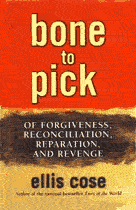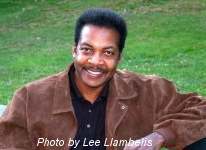 If, as the adage holds, the personal is political, the Calabash 2004 writer whose work most fully illustrates this combination is Ellis Cose, a Newsweek editor who has studied truth and reconciliation commissions and the vicissitudes of the traumatized self in the public arena. On Saturday afternoon of Calabash 2004, he summarized the findings of his most recent book, Bone to Pick (Atria, 2004), which is organized around themes of reconciliation, revenge and forgiveness.
If, as the adage holds, the personal is political, the Calabash 2004 writer whose work most fully illustrates this combination is Ellis Cose, a Newsweek editor who has studied truth and reconciliation commissions and the vicissitudes of the traumatized self in the public arena. On Saturday afternoon of Calabash 2004, he summarized the findings of his most recent book, Bone to Pick (Atria, 2004), which is organized around themes of reconciliation, revenge and forgiveness.
Though he was scheduled late, after Maryse Condé cancelled due to an injury, Cose’s presentation in many ways struck to the emotional and intellectual heart of Calabash. There is nothing more intimate an experience than recovering from severe trauma or trying to represent it adequately through language. Nations, too, must emerge from the traumas of dictatorship and state-sponsored oppression, and to do so, to break fully from a violent and tyrannical past. Nations such as Peru, South Africa and Argentina have attempted to tear the veil of the official secrecy that cloaked systematic human rights abuse by bringing perpetrators and victims together to expose crime and to enact something resembling rapprochement.
Perhaps the most widely examined example of this process is South Africa, which ten years ago had its first democratic vote after decades of apartheid. In 1995, Nelson Mandela’s government established a Truth and Reconciliation Commission, with proceedings to be chaired by Anglican Archbishop Desmond Tutu. The commission was charged with extending legal immunity to those who committed political crimes if, and only if, they offered “a full disclosure of all relevant facts.” A delicate and volatile combination of factors round out the context, as the editors of Human Rights in Political Transitions note: “Personal rights are all too often pitted against the greater public good, forgiveness against punishment, the interests of the present against the possibilities of the future, national cultures against international norms, and the pull of particular circumstances against the lure of universal ideals” (Hesse and Post 28).
Where does forgiveness play a role? Cose began his presentation with a definition. “Forgiveness,” he said, “is two-fold.” One happens within the self. This is the forgiveness in which one engages in “the renouncing of the urge and the need for revenge, the renouncing of bitterness, which seems to me part of what eventually maturity and leading a healthy life is all about.” The second, the external, has to do with absolution.
When Cose arrived in Johannesburg, South Africa in 1998, the revelations of apartheid-era atrocities were continuing to unfold, and anger and bewilderment were very fresh. South Africa’s government, it was documented, had gone into the planning stages for biological and chemical warfare against black South Africans. Cose said, “They had plans on the books to render the black population sterile. They had plans on the book for chemicals that could create mass hallucinations and worse.” Narratives of vicious and gratuitous crimes were coming out one after another.
All of which gave the public process of confession to contrition to reconciliation a razor’s edge. Tutu, a Nobel Peace Prize recipient and a figure of great moral authority, wept after one testimony. Still, he ultimately affirmed the theme of the title of his memoir of that period, No Future Without Forgiveness. In the face of the horrifying tales of torture and abuse, Tutu invoked the spirit of ubuntu, a conception that “my humanity is bound with yours” and action based accordingly as he envisioned the possibilities of an inclusive, multiracial democracy. Not all South Africans made that leap of faith. Ntsiki Biko, Steven Biko’s widow, for one, objected publicly and filed suit challenging the commission’s power. Though the suit was rejected, she spoke for others who were firm in contending that forgiveness could happen only through justice, which would mean punishment for the perpetrators.
 “What I realized the more I spent time in South Africa,” said Cose, “was that Desmond Tutu’s view, though terribly powerful, was only one view of what was going on in that process.” He then described the experiences of Thandi Shezi, a woman from Soweto, the largest of the black townships, who came of age in the 1970s. She was on the fringe of the Soweto uprising of 1976 and took a rubber bullet to the leg. Later, because she was a member of Khulumani Support Group and therefore part of the liberation struggle, she was arrested, raped and tortured in a Johannesburg prison. Years later, she became one of over 20,000 people who told story to South Africa’s TRC.
“What I realized the more I spent time in South Africa,” said Cose, “was that Desmond Tutu’s view, though terribly powerful, was only one view of what was going on in that process.” He then described the experiences of Thandi Shezi, a woman from Soweto, the largest of the black townships, who came of age in the 1970s. She was on the fringe of the Soweto uprising of 1976 and took a rubber bullet to the leg. Later, because she was a member of Khulumani Support Group and therefore part of the liberation struggle, she was arrested, raped and tortured in a Johannesburg prison. Years later, she became one of over 20,000 people who told story to South Africa’s TRC.
“She went through her story in excruciating detail,” recalled Cose. “And at the end of it, she said she felt a certain release, a certain power, because she was finally able, as she saw it, to tell the world and to tell South Africa what apartheid really meant.” But the story was not over, and the catharsis was short lived. The next phase of the process involved one of the five cops who had assaulted her; he was expected to confess and atone for what he had done.
“As she listened to him, she began to realize where he was going. He said, ‘I don’t think I know this woman, I don’t think I’ve ever seen this woman, and what she is talking about I could not possibly have done’ … And so she was violated yet again. As we talked about the whole TRC process, she said, ‘What I realized is that there is no reconciliation without truth, and there is no reconciliation without reparation.’
“That became for me a powerful paradigm as I explored this issue, not only in South Africa but elsewhere, of the process of souls that have been violated coming back from that in effect.”
That example contrasted with another Cose described at length involving a U.S. preacher whose son was murdered by a guy high on crack. The minister, filled predictably with rage and grief, went to the sentencing hearing, where something unpredictable happened.
Cose explained, “What happened was that the guy made an apology, which this minister listened to and decided it resonated with at least something of the truth. So he made it his business to go and seek out this guy, even when he was in prison, and became convinced that this guy’s remorse was real, his atonement was real, so much so that when the fellow subsequently applied for parole, this minister supported his call for parole. So much so that when the guy was released and got married, this minister performed the wedding ceremony. Part of Bone to Pick is the exploration of stories like this, and stories that illuminate different parts of the reality Fandish Azi alluded to.”
It appears that ad-hoc tribunals and truth commissions will be the vehicles for nations like South Africa. Although after many years of anticipation, an International Criminal Court has been established, the international mechanism of enforcement of human rights and the legal apparatus for prosecuting the gravest crimes against humanity have been stymied. The United States, which helped draft the ICC charter, has opposed the court and has undercut its work by forging bilateral agreements assuring immunity for U.S. military and civilians. Bone to Pick offers at best a very guarded hope for the future.
“As one truth commission after another has realized, reconciliation … requires transformation of individuals and where countries are concerned of the very norms of the society. Rediscovered history can no doubt help that process, as can recovered memories, but they can’t force it to take place. By the same token, the idea that documenting atrocities and memorializing the victims will prevent such things from happening anywhere again is rooted much more strongly in faith than in history.
“‘Never again,’ in other words, is not a plan, it is a prayer. A prayer that we will bridge the connections from one atrocity to another, that we will see bigoted demagogues for what they are, that we will turn against those who scapegoat others. It is a plea that we remember not just the Holocaust but how easily it came about. But there is little reason to believe people typically carry the lessons of one tragedy or one atrocity to another.”
The failure to apply the lessons of history, he said, belongs first to the perpetrators of atrocities and their supporters. “Each conflict, they convince themselves, is unique. Each group, they tell themselves, is different. Each enemy is uniquely awful or repugnant, so they transfer little moral meaning from one situation to another, not at least until the world rises up in anger and demands a different perspective.”
The failure extends to passive bystanders as well, Cose noted, and in this respect, his presentation, though bereft of poetry and the felicitous phrasing which characterized the rest of the weekend’s sessions, was perfectly situated at Calabash because the theme came back to community. “At some point in virtually every case where atrocities took place, widespread acceptance [by a silent majority] became widespread approval.”
See www.elliscose.com.
Work Cited
Hesse, Carla and Robert Post. Introduction. Human Rights in Political Transitions: Gettysburg to Bosnia. New York: Zone Books, 1999.
Tutu, Desmond. No Future Without Forgiveness. New York: Doubleday, 1999.





